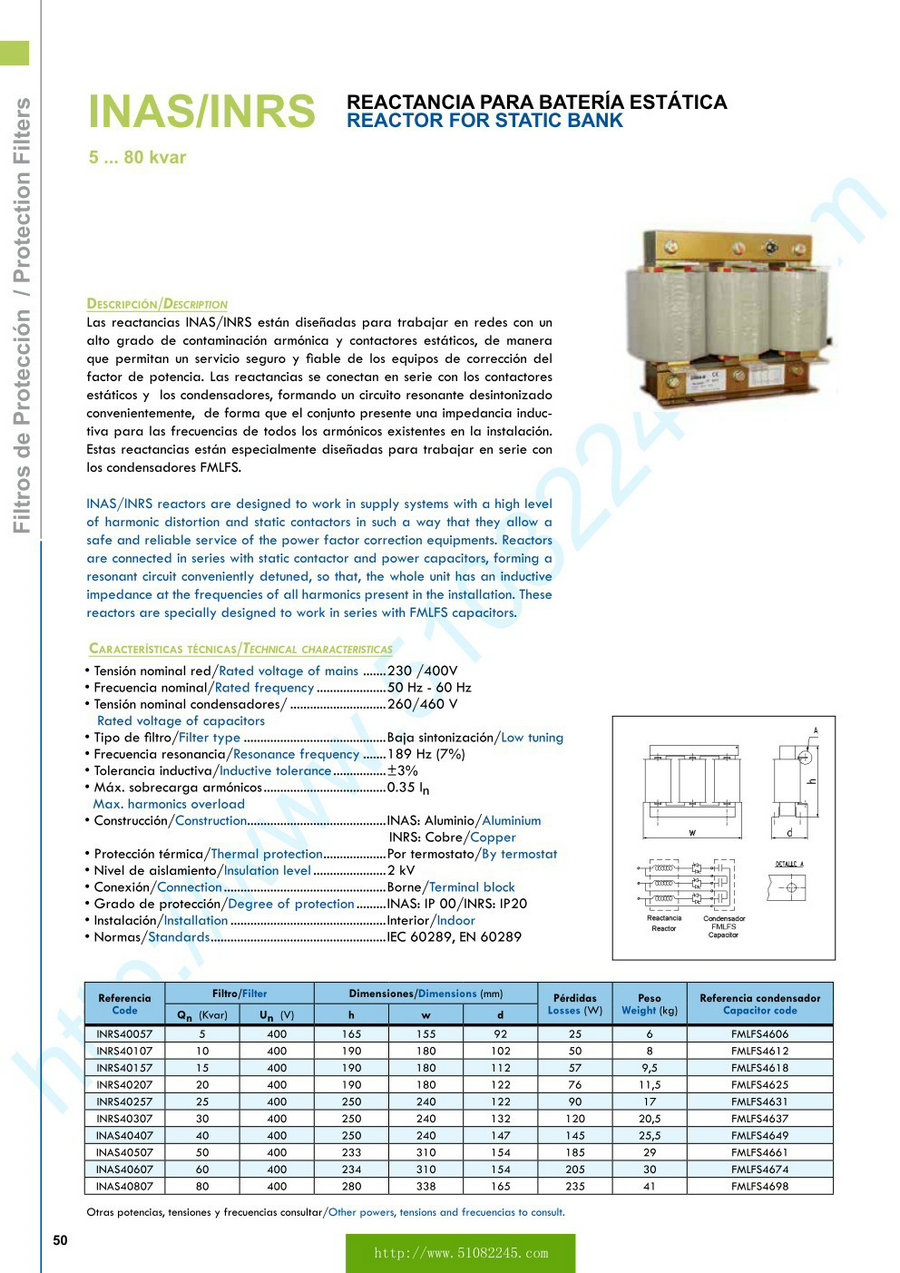|
Traditional reactive power compensation equipment with electromechanical contactors, has a well proven performance in installations where the load has, slow variations and it is not very sensitive to voltage fluctuations. Today, however, more and more industrial installations include electronic equipment very sensitive to voltage variations (PLC, computers, etc.) and also very fast changing working cycles (automatic welding machines, robots, etc.).
Reactive power compensation with static contactors offers the best answer to these new industry requirements.
LIFASA automatic capacitor banks with static contactors, use thyristors instead oftraditional contactors. The thyristors switch-on capacitors on zero crossing voltage, and switch them off on zero current situation. This firing strategy grants a totally transient free switching of power capacitors, avoiding any problem with transient overvoltages.
This transient free switching gives a very fast reaction time of the power factor equipment with sudden reactive power demand variations. This reaction time (the time to switch on or off a capacitor step) is usually not higher than 20 milliseconds. This means that up to 25 operations per second are possible.
LIFASA automatic capacitor banks with static contactors are supplied completely assembled and ready for use: it is only necessary to give them the operation signal from a suitable current transformer, and to connect them to the mains by cables of adequated section. They are composed of the following elements:
Reactive power Controller
These banks use the MCE-F controllers, that are a fast response variation of the MCE series of controllers. These controllers
are specially designed for the control of thyristor capacitor banks and are characterized by their optically isolated
outputs and also for having an extremely fast response time
that can be up to 20 milliseconds.
Control Module
It is formed by an electronic control circuit, that gives the firing pulses to the thyristors to switch on at zero voltage point
and to switch off at zero current situation.
The control module is assembled on a printed circuit board
and receives the action signal from the MCE controller.
Power Module
It is formed by three pairs of thyristors in anti-parallel connection, mounted and assembled on well dimensioned heat
sinks, protection fuses and limiting inductances.
CapaCitors
These banks use the six terminal versions of FMLS and FMBS
series of power capacitors.
Technical Characteristics
Tensiones nominales*/Rated voltages*…………440 V
Frecuencia nominal/Rated frequency…………50 Hz/60 Hz
Potencia nominal/Rated power…………7.5 ... 960 kvar
Pérdidas dielétrica/Dielectric losses…………< 0.2 W/kvar
Pérdidas en condensadores/Capacitors losses…………< 0.5 W/kvar
Sobretensión máxima/Max. overvoltage…………1.1 Un (8h/dia/day)
Sobreintensidad máxima/Max. avercurrent…………1.3 In
Reguladores/Controllers…………MCE-12 F
Retardo de conexión/Switching on delay…………20 ms (típico)/ (typical)
Programas de trabajo/Working programs…………1:1:1:1: , 1:2:2:2: y/and 1:2:4:4:
Transformador de corriente/Current transformar…………/5A opcional/optional
Gama climatica/Temperature range…………-25/+45oC max. temp.
Grado de protección/Protection degree…………
Instalación/Installation…………Interior/Indoor
Normas/Standards…………, , ,
CARACTERíSTICAS GENERALES / GENERAL CHARACTERISTICS
* Other voltages on request.FOR STANDARD EQUIPMENTS WITH THYRISTOR CONTACTORS, ON REQUEST
Protection filters
Protection filters are used, in supply networks having a high
level of harmonic distortion, when the final objective is reactive power compensation at the fundamental frequency.
Their purpose is to avoid that harmonic currents overload the
capacitors by diverting them to the mains. Protection filters
are made by connecting reactors in series with capacitors,
in such a way that the tuning frequency of the whole unit is
set at a value between the fundamental frequency and the
frequency of the lowest present harmonic, which is usually
the 5th order harmonic. In this the filter has a high inductive
impedance for all the harmonic frequencies.
Connection of a reactor in series with a power capacitor,
makes the capacitor to work at a voltage higher than the
supply voltage. Because of this, capacitors to be connected to protection reactors, need to be designed to work at
higher voltages than standard capacitors. The choice of the
tuning point of the filter is a balance between the quantity
of harmonics rejected by the filter and the voltage increase
produced in the capacitor at the fundamental frequency.
It has to be also kept in mind that reactive power supplied
by the filter at rated frequency (50 or 60 Hz), is different to
the one that the capacitor would supply without the reactor.
Taking all the above into account, the reactor is normally
chosen in such a way that its impedance is about 7% the impedance of the capacitor that protects. This will give a tuning
frequency, for example at 50 Hz, of 189 Hz. Other tuning
frequencies are also available.
Reactor INAS/INRS
INRS40057 INRS40307
INRS40107 INAS40407
INRS40157 INAS40507
INRS40207 INAS40607
INRS40257 INAS40807
| 